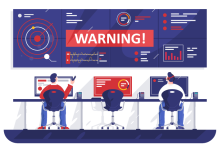
It might be time for some of us in the customer service industry to start dusting off our resumes. There’s new, tough competition for customer service jobs and they’re on 24/7/365. They never take a break, never go on vacation, they don’t even require benefits. They’re not just after customer service jobs either, look out sales, marketing, and even HR recruitment: digital employees, often in the form of chatbots, have entered the workforce and there’s no looking back.
The market for customer support chatbots and automated messaging services is surging to all-time highs due to recent strides being made with machine learning and artificial intelligence, as well as the prominent push into the space by the likes of Amazon and Facebook. Now, when I say that it may be time for customer service professionals to start dusting off their resumes, there’s some debate as to why.
Critics of chatbots argue that these technologies will replace live agents, sacrificing the human touch that is required when addressing complex customer inquiries, at the expense of the customer experience. It must be noted at this point that automation technology can only take over the mundane, repetitive tasks. Creativity, empathy, smart problem solving, judgment, these human traits cannot be programmed into software for quite some time to come, which is where the potential for human employees lies. Hence, others will argue that the introduction of more automation will help organizations provide faster support (for simple inquiries) while bolstering the organization’s bottom line. If this is the case, those new resumes can be put to use as agents seek opportunities to advance in the company.
How? In Aspect’s Agent Experience survey, we surveyed agents directly to see how they feel about their new digital colleagues. The survey found that agents feel there are benefits to their careers from the introduction of automated services. Take a look:
- 79% of agents feel that handling more complex customer service issues improves their skills
- 72% said that adding chatbots to their organization would make them feel they are having a bigger impact in the company
- 64% agreed chatbots enable them to provide more personalized service experiences for customers
- 59% said that as employees, they feel more satisfied in their jobs and more committed to the company
Contact center agents are not of the belief that the introduction of automation has to be an either-or proposition. Instead, agents and customer support chatbots can—must!—work in unison to establish a higher level of customer care. First projects of ours have shown us that employees indeed welcome the help, as it frees them up to spend more time on the more intricate customer service issues.
However, if you’re ready to hire your first digital employee to serve on the front line of your contact center, you must have a strategy in place to leverage your personnel as you offload basic responsibilities onto this new type of hire. After working with several organizations as they deploy automated self-service technologies, I’ve compiled these suggestions to help ease the transition as you bring new technology to your contact center:
Get your agents in top shape: I don’t mean physically, of course, but train your agents and provide excellent coaching. In return their skills will be honed, they’ll stay engaged, and provide better service—service of a type a chatbot will not be able to take on for years to come. In addition, investing in your agents endears them to your organization, helping to cut down on your churn rate. As customer support chatbots and other technology take over basic responsibilities, be sure to simultaneously increase training and responsibilities so that your agents are prepared to field more complex requests more ably.
Design well, test thoroughly: This could be a complete post on its own so I’ll stick to the basics. Take your time designing the customer support chatbot. Create a “conversational architecture” for your chatbot and design the dialogue flow and storyboard to ensure your chatbot responses are conversational, logical, and follow normal patterns of human conversation (e.g., accommodating follow-up questions, not just coding question-answer pairs). Once your chatbot is operational, test thoroughly using a diverse set of testers (optimally outside of your organization). This is when your chatbot responses will start to become accurate and will help you avoid an embarrassing launch.
Get social: You’ve got to stay connected with your customers and provide personal touch as your customer service front line becomes automated. An active social media presence is a great way to connect and resonate more deeply with your customers. Further, robust customer service conducted on social media gives you free publicity as you demonstrate your value. If your agents have downtime due to the introduction of automation, send them to social platforms to address concerns in real time. You never know, their work could go viral, giving you a priceless marketing opportunity at no cost to your organization.
Manage your automated workforce: Automated contact center solutions can help you meet demand without overextending your agents. But what if your customer support chatbots or other solutions themselves are causing headaches for customers? Invariably, you will need to conduct analysis, user testing, and address concerns as they crop up when it comes to these solutions. Training your agents to isolate and ameliorate any of these concerns will help keep your processes moving along smoothly.
So let’s roll out the red carpet for our new digital colleagues. Get your agents and chatbots on friendly terms and you’ll have succeeded in deploying automated contact center software without losing the human touch.




